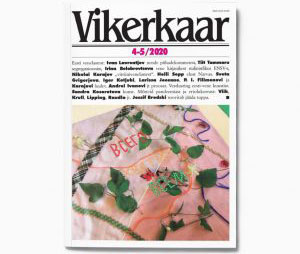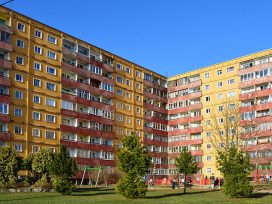86 articles

Like sustenance and sex, society can’t be reproduced without shelter. That is why today’s housing crisis is so central. Contributions to this focal point look at both the winners and the losers of the crisis: the people profiting from the financialization of housing and those reimagining the right to the city.
The focal point is curated by Christoph Laimer, editor-in-chief of dérive, and Aro Velmet, editor of Vikerkaar. Brian Haman is the editor of the project. Read the full editorial here.




Whose rules determine how space is used or shared? Whose identity does a room express? The home is the place where power relations are established and contested. Ingrid Ruudi looks at how modern living space has shaped and been shaped by gender roles in Estonia.

Italian cities are ordinarily international tourism hotspots. Their economic recovery post-lockdown appears to depend on visitor numbers. And yet massified tourism brings its own pressures, undermining local housing provision. Alessio Giussani investigates the Italian city’s precarious situation, taking Airbnb’s impact as example.

Belgrade residents cannot afford the Savamala waterfront’s extortionate real-estate prices. Its decision-makers draw aspirational parallels between today’s urban development and the area’s post-Ottoman era but ignore the failures of both. Seemingly a-historic glass facades cannot disguise the strategic politicization of history, says Miloš Jovanović.

We are in the midst of this century’s second housing crisis, on top of the existential threat of climate change. Social housing could trigger social change and play a key role in decarbonization. The former poster child of housing poverty, Brazil, offers unique lessons.

The ‘housing question’ was formed not by the issues of poverty and necessity, but by bourgeois norms and demands – often intended to tame social unrest. From minimal dwelling to air quality, Michael Klein surveys the 19th-century discourses which still influence political thinking, and tend to exclude concerns of the underprivileged.

Urban housing is about more than private habitation. It is linked to a need for public spaces, amenities and services. Bustling streets are social condensers that draw people together, promote dynamic exchange and form part of the glue that binds communities. How should city planners foster these crucial interactions?

Lack of available housing has a particularly severe impact on Bulgarian and Romanian Roma: with few formal work prospects, they are forced into substandard accommodation and homelessness. Institutional and social discrimination compounds the problem, shifting the blame from unscrupulous tenants and employers onto vulnerable citizens.
Instead of temporary solutions like shelters and hostels, Finland concentrates on providing permanent social housing to those in need. Although it requires significant investment, it’s always more cost-effective to end homelessness rather than trying to manage it. Also, it’s the right thing to do.
Speculation is based on the belief that housing prices will keep increasing and there will always be a bigger fool willing to pay a higher price. Anita Aigner looks into the culture of responsibilization and the policies that turned real estate ownership into pure, abstract investment.
Insufficient housing in growing cities is a pressing issue, for which the German right blames migration and proposes exclusive free-market solutions.
The spatial limits of speculation have been broken and the world is constantly combed for investment opportunities. The aim is to create the image of prosperous, dynamic cities, but for the majority of the urban population, it’s more a curse than a blessing.
Rents are usually considered affordable when below around a third of a household’s income. But this rule of thumb is tailored to middle-class homes, ignoring the financial realities of low earners who struggle to cover necessities.
Housing is part of the foundation upon which all other human social relations are built. Like sustenance and sex, society can’t be reproduced without shelter. Vikerkaar editor Aro Velmet announces the new Eurozine focal point ‘Room temperature: Housing in crisis’.
Instead of uniformity, commoning urban spaces offers an inclusive life, open to differences. Through self-managed initiatives, the ‘right to the city’ becomes the right to collectively produce it through creative cooperation.
Tenants are the new proletariat. Rents are among the main sources of global capital accumulation, and tenants’ vulnerability is increasing. Using their shared experiences as a basis for struggle, School of Echoes tells the story of organizing against gentrification, taking issue with the affordability discourse and the institutionalized housing movement.



